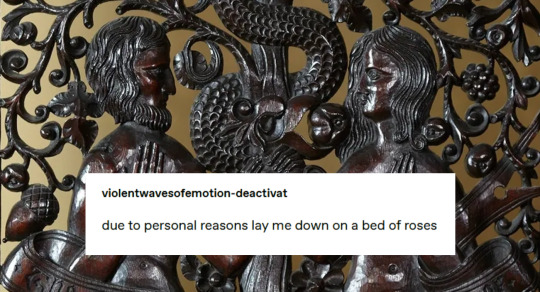Text
Noble girls received confusingly mixed messages about the clothing they should choose. The clearest Biblical guidance came from the author of 1 Timothy who had advised that ‘women should dress themselves modestly and decently in suitable clothing, not with their hair braided, or with gold, pearls or expensive clothes, but with good works’. This provided justification for generations of Christian authors who associated fine clothing with sinfulness. Jean de Meun, whose Roman de la Rose was to be found in many fifteenth-century noble houses, asserted that ‘a woman who wants to be beautiful . . . wants to wage war on Chastity’. Yet devotional books routinely indicated the high status of virgin martyrs and the Virgin Mary herself by depicting them in opulent and elegant garments, like the cloth of gold dress that St Cecilia wore over her hair shirt. The upper classes believed that ‘in a well-ordered society, consumption patterns would reflect the hierarchy of status’. In 1363 parliament had even introduced sumptuary laws outlining the types of clothing permissible to those of various stations. Gentlemen whose lands were worth less than £ 100 annually were forbidden to wear silk, embroidered clothing, gold jewellery ‘or any manner of fur’, and their wives and children likewise. Knights whose land was valued at less than 200 marks annually were forbidden to wear the most expensive wools and furs or cloth of gold, and even those receiving £ 1,000 a year could only wear ermine or cloth embroidered with jewels in their headwear. Although the legislation was repealed just over a year later, as Christopher Dyer has argued, it indicates the legislators’ ‘assumption that the higher aristocracy ought to wear’ opulent apparel that distinguished them from their inferiors.
One author who tried to steer a helpful middle course was Christine de Pisan, the daughter of an Italian physician and widow of one of the secretaries of Charles V of France...In her manual, Le Trésor de la Cité des Dames, Christine advised ‘the wise princess’ to ensure that ‘the clothing and the ornaments of her women, though they be appropriately beautiful and rich, be of a modest fashion, well-fitting and seemly, neat and properly cared for. There should be no deviation from this modesty nor any immodesty in the matter of plunging necklines or other excesses.'
-J.L. Laynesmith, "Cecily Duchess of York"
39 notes
·
View notes
Text
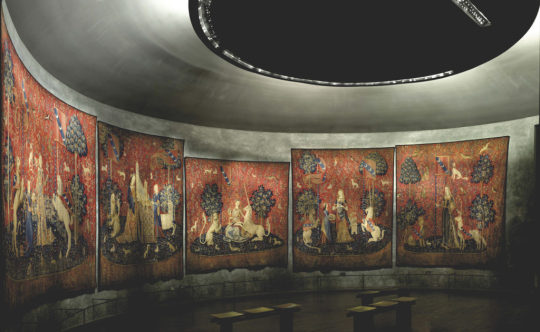
The Lady and the Unicorn is the modern title given to a series of six tapestries created woven in Flanders from wool and silk, from designs drawn in Paris around 1500. The set, on display in the Musée de Cluny in Paris, considered one of the greatest works of art of the Middle Ages in Europe.
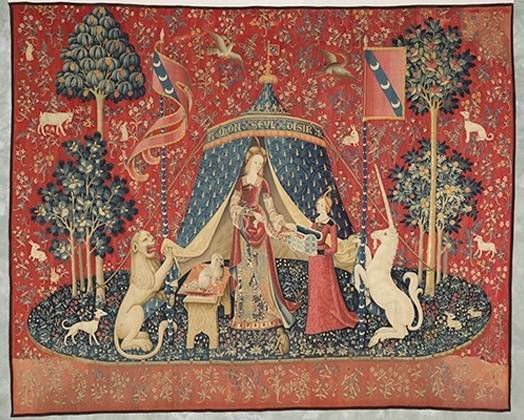
"According to my only wish."
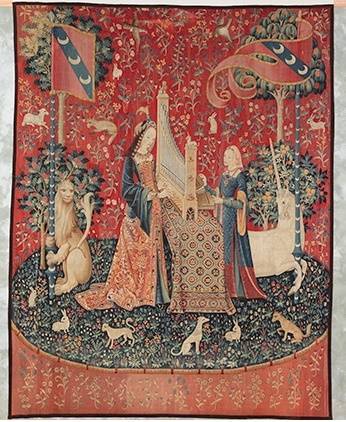
"The lady with the unicorn. Hearing"

"The lady with the unicorn. Touch"
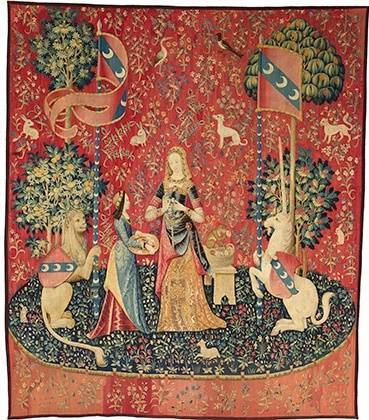
"The lady with the unicorn. Smell."
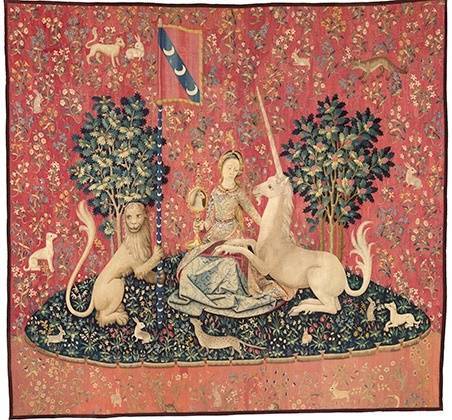
"The lady with the unicorn. Vision"
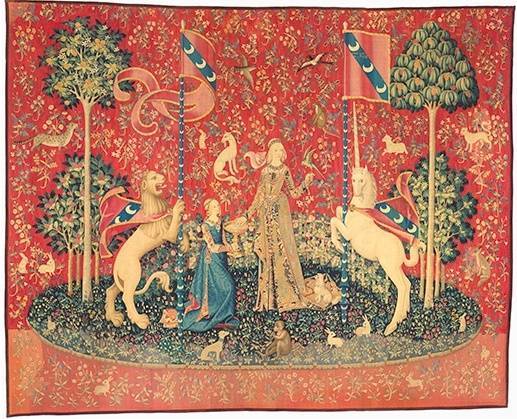
"The lady with the unicorn. Taste"
14K notes
·
View notes
Text

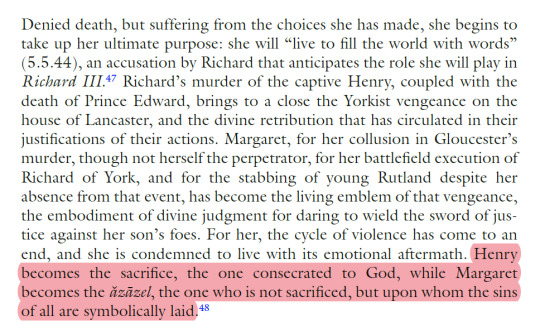

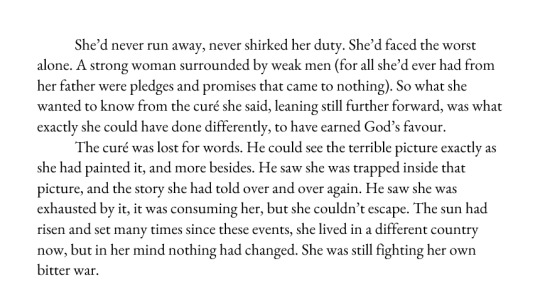
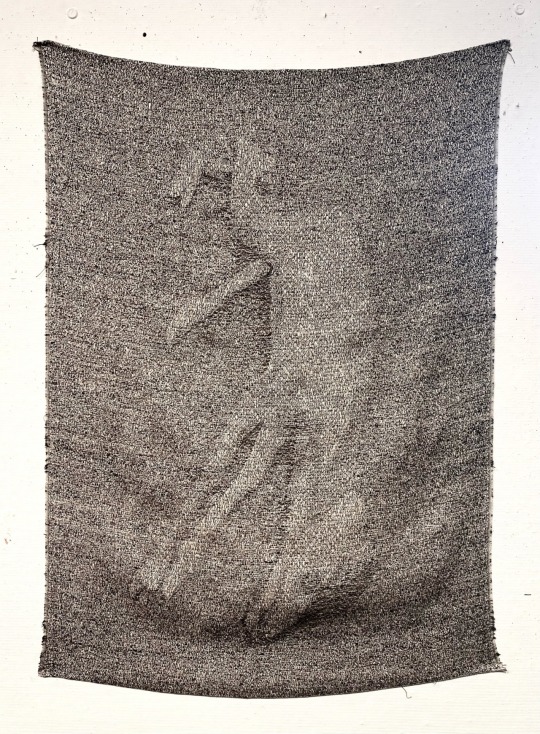

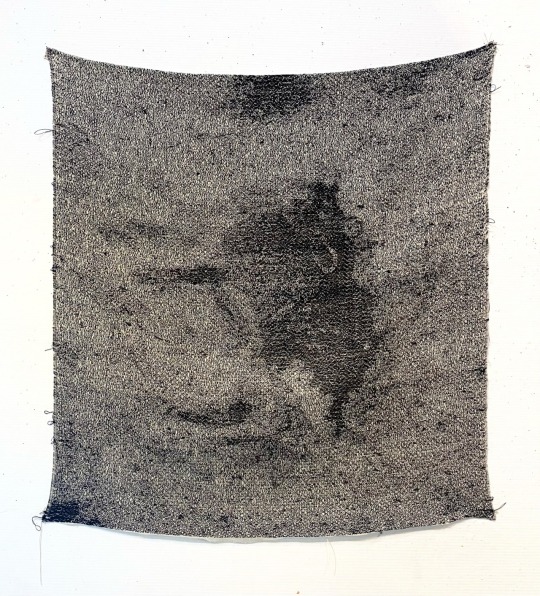
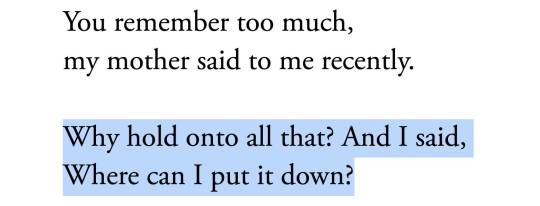
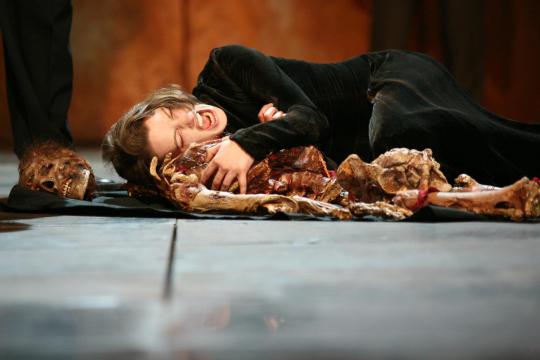
Margaret of Anjou After Tewkesbury
Niccolò dell’Arca, Lamentation over the Dead Christ (figure of Mary Madgalene), 1463 | Sandra Logan, Shakespeare's Foreign Queens: Drama, Politics and the Enemy Within | Max Ginsberg, War Pieta (detail) | Livi Michael, Accession | Anneliese Merrigan, To All the Bodies I've Dreamt of Carrying in Absence of Yours | Anne Carson, 'The Glass Essay', Glass, Irony & God | Margaret (Katy Stephens) and the remains of her son, Richard III (RSC, Michael Boyd 2007).
26 notes
·
View notes
Text
I've finally figured out why I get so irked by the whole "Edward was illegitimate because his father didn't legally recognise him when he was born" thing.
There's this cultural narrative that parents will always break from their illness at the sight/sound of their children. It's a bit ridiculous, but it is so embued in our society that when it doesn't happen we get suspicious.
So I don't know whether we should accept that Edward wasn't really Henry's child simply because the sight of his son didn't magically fix his severe catatonia.
38 notes
·
View notes
Text
It's 2024. Authors writing novels about the Wars of the Roses should be past referring to Henry VI as "mad Henry". Especially if they're Ricardians who end the novel with two pages where the protagonist/POV character foretells and decries the horribleness of Tudor-era ableism towards Richard III.
The author clearly understand that ableism is wrong and that "period accuracy" is no excuse for ableism. But still sees fit to mock Henry VI for his mental illness, to make it his main identity. Is it because ableism is okay when a Yorkist does it or when the victim is Lancastrian? Is it because ableism is okay if you're mocking someone with a severe mental illness instead of a physical disability?
41 notes
·
View notes
Text
"In the medieval imagination there was a constant tension between the idea of women’s changeable, corrupting, Eve-like influence in the world; the sense of their childlike inability to govern themselves or to be responsible for their behaviour; and the ideal of the vulnerable lady and mother who might intercede, Madonna-like, to create peace."
-J.L. Laynesmith, "Cecily Duchess of York"
10 notes
·
View notes
Text
I'm getting so sick of major female characters in historical media being incredibly feisty, outspoken and public defenders of women's rights with little to no realistic repercussions. Yes it feels like pandering, yes it's unrealistic and takes me out of the story, yes the dialogue almost always rings false - but beyond all that I think it does such a disservice to the women who lived during those periods. I'm not embarrassed of the women in history who didn't use every chance they had to Stick It To The Man. I'm not ashamed of women who were resigned to or enjoyed their lot in life. They weren't letting the side down by not having and representing modern gender ideals. It says a lot about how you view average ordinary women if the idea of one of your main characters behaving like one makes them seem lame and uninteresting to you.
16K notes
·
View notes
Photo
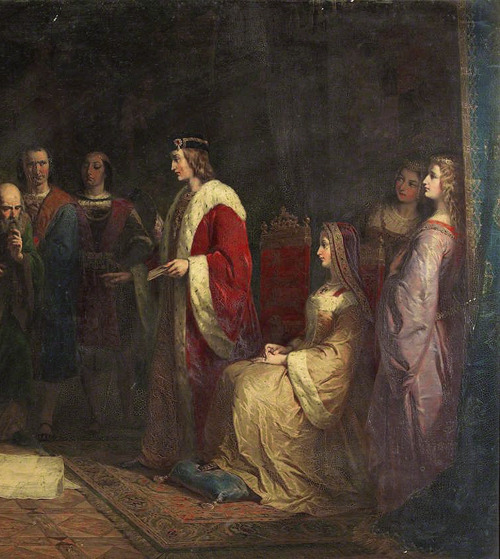
Henry VII and Elizabeth of York, detail from John Cabot and His Son, at the Court of Henry VII by John Adam Houston, 1862.
475 notes
·
View notes
Text
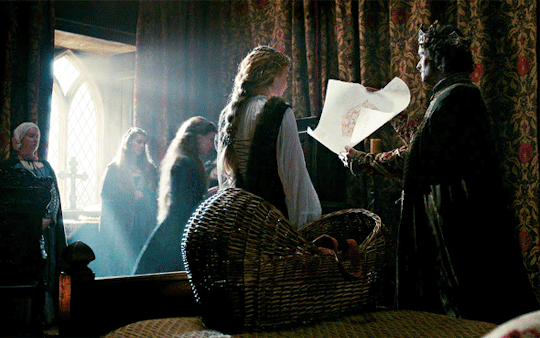

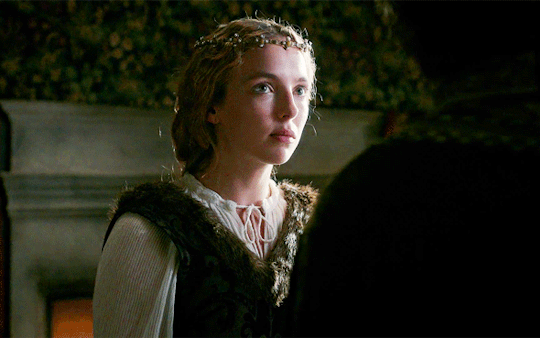
JACOB COLLINS LEVY and JODIE COMER as HENRY VII and ELIZABETH OF YORK in THE WHITE PRINCESS (2017)
226 notes
·
View notes
Text
The most obvious means by which a queen might exercise influence at court was through her close contact with the king in much the same way as other nobles did, although the nature of such influence is impossible to judge because it does not leave records behind. That women would advise their husbands, even kings, was accepted and expected: Christine de Pizan maintained that the wise princess would urge her husband to discuss matters with his councillors, and encourage others to advise him. Jacobus de Cessolis, recognizing that queens would thereby be privy to important matters of state, advised that a queen's 'wysedom ought tappere in spekynge that is to wete that she be secrete and telle not such thynges as ought to be holden secrete'. Queens were of course not exempt from the traditional misogynistic fear of the power of women's words to lure men, as Eve had done, into sin and folly. The fourteenth-century author of The III Consideracions Right Necesserye to the Good Governaunce of a Prince warned
And how be it that a kinge or Prince shulde love his lady and wyf in maner as him self, yit it is nat expedient that he uttyr unto hir, and discloosc the sccrccs, grcctc conscillcs and greet thingcs that he hath doon for his estate and for his landc, nc that in such thing he be governed aftir hir at som tymc, but he shulde allc daycs reserve unto him self the lordship and souvereyntee, or ellys many perilles may betide.
But to be governed was not the same as to be advised and there was also a strong tradition and rich literature of women wisely advising their husbands at all levels of society. This included encouraging a husband to make peace with his subjects or to be more generous to the poor or the Church as well as the familiar motif of intercession in response to a particular plea.
-J.L. Laynesmith, "The Last Medieval Queens: English Queenship 1445-1503"
37 notes
·
View notes
Note
I read your previous ask on which children Henry VII and Elizabeth of York favored and one thing that struck me is the mention of Weir saying EOY spent most of her time in the nursery away from Henry VII. Its funny because in her novelization of EOY life she heavily implies that while EOY was diligent to visit and over see the education of the children, she spent most of her time with Henry VII at court. I feel like Weir has done this multiple times lol. She makes these claims based on little evidence and then backtracks later on. Didn't she also back track on saying there was something romantic between Richard III and EOY? I'm indifferent to Weir, and there are worse historians, but its just funny she keeps doing this.
Hello! Yes, that's true! Alison Weir has made some outlandish claims before and then backed down. She spear-headed the debate in nonfiction circles about Elizabeth of York having a sexual relationship with her uncle then she was horrified at the number of people claiming that really happened — she literally said that in the biography she wrote about this queen lol, so I can't help but feel like she should be more considerate of what she claims if she's just going to deny it later on. For me Weir is more annoying than harmful at this point but annoying all the same because it feels like she's still the most accessible historian after all this time? If that makes sense.
7 notes
·
View notes
Text
I love that both Elizabeth Woodville and Elizabeth of York had grander coronations than their husbands <3
38 notes
·
View notes
Text



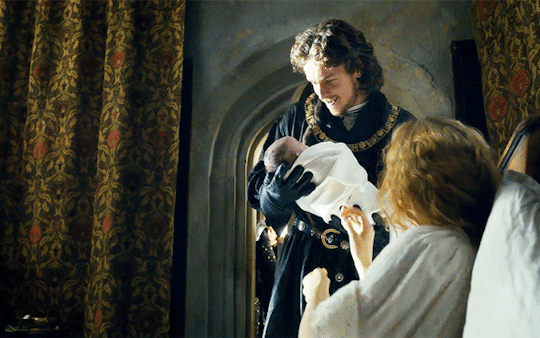
henry and elizabeth ( + baby arthur 🫶🏻)
253 notes
·
View notes
Text
Immediately after his [Arthur’s] death, Sir Richard Pole, his Chamberlain, with other of his Council, wrote and sent letters to the King and Council to Greenwich, where his Grace and the Queen’s lay, and certified them of the Prince’s departure. The which Council discreetly sent for the King’s ghostly Father, a friar observant, to whom they showed this most sorrowful and heavy tidings, and desired him in his best manner to show it to the King.
He in the morning of the Tuesday following, somewhat before the time accustomed, knocked at King’s Chamber door; and when the King understood it was his confessor, he commanded to let him in. The Confessor then commanded all those present to avoid, and after due salutation began to say, Si bona de manu dei suscipimus, mala autem quare non sustineamus? [If we receive good from the hand of God, should we not also tolerate the bad?] and so showed his Grace that his dearest son was departed to God.
⎯ Elizabeth of York: Queenship and Power by Arlene Okerlund
14 notes
·
View notes
Note
Who was/were Henry VII's favorite child? And Elizabeth of York's? And what about the grannies (Beaufort & Woodville)? Who were their favorite grandchildren? (well I suppose in Elizabeth Woodville's case there must be little documentation, so it must be harder to know...)
Hi, I'm so sorry for taking so long to reply—I was unable to do it for a time and then my notification went away and I completely forgot about this ask. I think it's very difficult to assess which of the Tudor children would have been their parents' favourite (or their grandmothers', for that matter, especially because Elizabeth Woodville died early in the reign and didn't live at court for too long). There isn't much in terms of evidence—for example, when Henry VII referred to any of his daughters as his 'dearest daughter' in some document or the other, it didn't actually mean X or Y was the daughter he liked the most, it was only a convention of speech. But since we're talking about this topic, I want to take the opportunity to talk about a few things. Under the cut!
Aside from caring for his proper education, we know Henry VII sent a gift of bow and arrows to Prince Arthur, probably in the same way his own stepfather Henry Stafford had done when Henry was Arthur's age and was living with the Herberts. We also know that in 1499 Henry allowed Prince Arthur to preside over the Order of the Garter festivities of St George's day, a very important occasion for the exercise of English kingship, so ceding his place was significant. We know he bought a lute for Mary and allowed her to dance, play and entertain guests at important occasions when she was still a little girl (she was still to turn ten at the time of Duke Philip's visit, for example). On the other hand, he also bought Margaret's entire trousseau that she took to Scotland—which of course was the normal fatherly thing to do when a daughter married (he also left a sum of money for Princess Mary's trousseau in his will). Some small things do denote particular affection though, like his gift of a book of hours to Margaret in which he wrote “Remember your kind and loving father in your good prayers” and “Pray for your loving father that gave you this book, and I give you at all times God’s blessing and mine.” That the Duke of Estrada noticed that Henry VII liked Prince Henry in such a fashion “it was quite wonderful” to see seems to be significant too. Perhaps more significant still was Margaret saying she wished she was back with her father: “but with a wish I would I were with your Grace now, and many times more, when I would answer.” Henry himself seemed to have resisted sending Margaret to Scotland for a long time. None of that suggests he was exceptional in terms of fatherhood but it does indicate that he wasn't a father who was emotionally distant as it has been claimed.
On the other hand, it's commonly accepted that Elizabeth of York was unusually involved with her children's care (even as a way of fleeing her husband's presence) which I don't think is necessarily true. Part of her duties as queen involved overseeing the care of the young children and the education of her daughters in particular. That one of the ladies of her household also oversaw the royal nursery doesn't indicate that Elizabeth spent most of her time in Eltham with her children instead of at the other royal palaces with her husband—going by the accounts of her privy purse expenses that have survived, it seems Elizabeth spent most of her time at Baynard's Castle, Greenwich, Westminster, and Richmond. Elizabeth also had servants that worked in the king's household and in Margaret Beaufort's so Weir's claim that she must have spent her time in the children's nursery doesn't hold any ground. That Elizabeth seems to have personally taught her children to write isn't exceptional either, for by the late 15th century the cult of St Anne was well established, and motherhood (which was fashioned after the Virgin and her family) involved teaching your children to read and write just like St Anne had taught Mary. Elizabeth of York's own mother had similar handwriting which indicates she might have taught Elizabeth and her siblings as well.
We know that Henry VIII later claimed that the news of his mother's death was the most hateful intelligence he had ever received. I think it denotes his great attachment to her, but it doesn't tell us anything about Elizabeth favouring him over his siblings as I've seen likewise claimed. We know she took Prince Henry with her to the Tower on the occasion of the Cornish rebellion of 1497, but the chronicler's failing at mentioning Princess Margaret and Mary's location doesn't mean they weren't also there with Elizabeth (it just denotes that society prized sons over daughters, just like some chroniclers noted the births of Prince Arthur and Henry but not the births of Princess Margaret, Elizabeth or Mary). In fact, looking at Elizabeth's privy purse expenses of the year 1502-1503 we see she kept Princess Margaret perhaps closer to her than the rest of her children—but we can't imply much from that fact either. It seems clear that in that year Elizabeth was preparing Princess Margaret for queenship when we consider Margaret was about to leave for Scotland. Another curious fact is that in a book of hours that belonged to Elizabeth, we only see annotated the births of Prince Arthur and Princess Mary (together with Henry VII’s victory at Bosworth, his victory at Stoke Field, and Henry and Elizabeth’s wedding), yet we can’t say for sure Elizabeth was the one who annotated those dates.
Further, an Italian ambassador speaking of a certain prince standing together with Elizabeth (“her son the Prince”) does not necessarily mean he was talking about Prince Henry, as has been commonly assumed. Re-reading Laynesmith’s take on the scene, I realised we can assume “her son the Prince” to be Prince Arthur. Prince Henry wasn’t referred to as ‘the Prince’ but as ‘My Lord of York’ or ‘the Duke of York’. Only the Prince of Wales (Arthur) was referred to as ‘the Prince’ in the same way Catherine of Aragon was referred to as ‘the Princess’ and Princess Mary was referred to as ‘My Lady Mary’. So what happened in that visit was that the ambassadors saw Prince Arthur twice, once with his father and once with his mother. It makes sense that Arthur would be so on display as he represented the future of the Tudor monarchy at that time. Yet another Tudor myth discredited by paying attention to the cultural context.
So, in conclusion, I think it's hard to tell which children each parent favoured/liked the most but we can say that both Henry and Elizabeth were attached to their children—the grief they displayed at the news of Arthur's death is a great indication of that. However, I don't think we can say they were exceptionally doting parents, especially not to the extent that Elizabeth of York is popularly claimed to have been. I think relegating her to the domestic sphere of motherhood overlooks the importance and weight of her queenship, but that's a topic for another post.
Anon, sorry if my answer was disappointing but I've been ruminating on those claims for a long time by now 🌹x
65 notes
·
View notes
Note
Recently there's been this trend of rather repetitive and questionable facts about the Tudors on tik tok not to bore you with them all but I keep seeing "Elizabeth and henry knew henry⁸ would be a tyrant" is there any historical backing to this at all?
Hi! No, there really isn't. There's not much documented on the relationship of Elizabeth of York with any of her children as I pointed out here, let alone her youngest son (the claim that Elizabeth of York neglected her queenly duties to be some domestic madonna enshrined in her children's nursery is plain wrong and also harmful to the historical memory of the real Elizabeth). The idea that she kept Prince Henry extraordinarily close to her and that she 'spoilt' him in the process is really much more based on fiction and wishful thinking than facts.
Now about Henry VII's relationship with his son in his last years, I think it had to do more with overprotectiveness about his safety as the only acceptable heir than with 'protecting the world from' him, if that makes sense? Please always take everything you see on tiktok with a massive grain of salt, etc. Hope this helps! x
#also please take a look at the ask i linked :)#for more context#elizabeth of york#henry viii#henry vii
26 notes
·
View notes
